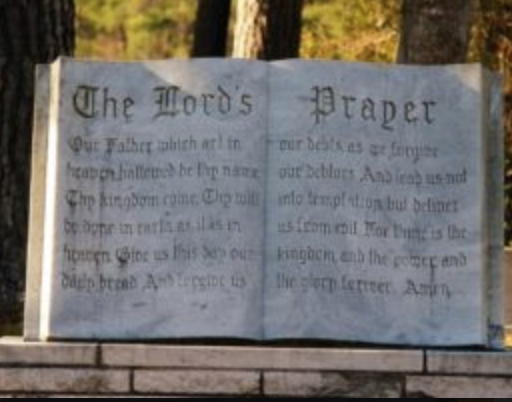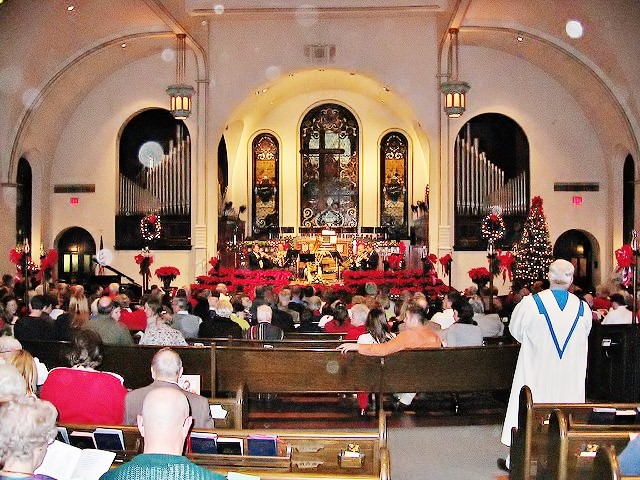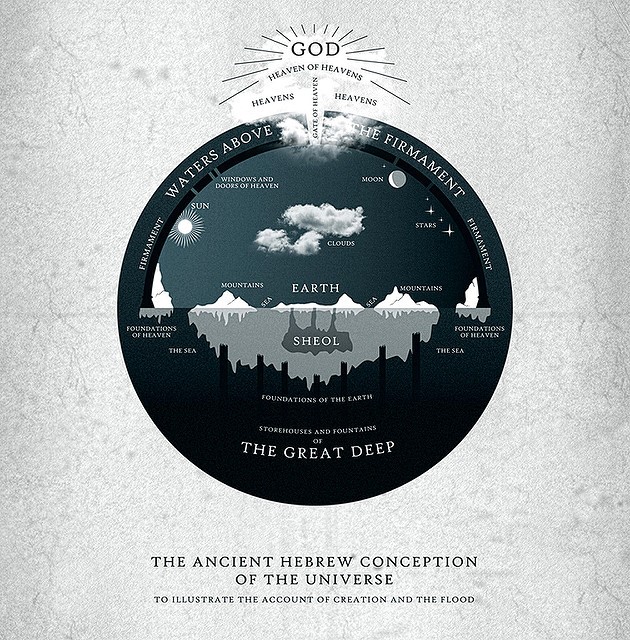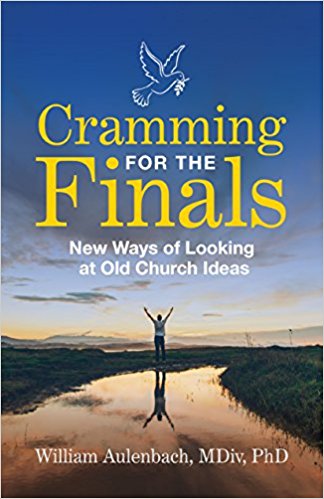While visiting Jerusalem in November 2017, I attended an interfaith book launch for a book written by a Palestinian Arab Christian. At the reception, I spoke with an Evangelical Lutheran pastor about her church in Jerusalem and asked how Jews, Christians and Muslims treated the LGBTQUI community in the Holy Lands. She told me that many of the people in her congregation had “bound consciences.” She then explained that those two words meant the church members were working out how to accept the gay community in both their personal and their church lives. Huh?
My main point in this blog post is to talk about how some folks continue to believe what they believe, despite all the facts and evidence in front of them. Let me use as an example the great majority of all Christians who, day in, day out, week in, week out, continue to address their prayers, their sermons, their creeds, and their slogans to a god (whom I call NoOneUpThere) who lives in a house (mansion?) above a three-tiered flat world. They continually address their deity with a lot of beseeching, pleading, and, usually, a laundry list of what NoOneUpThere is to do during the coming week. Does this sort of theology come anywhere close to how the real world works? To me, it resembles flat-Earth thinking.
As I suggested in last week’s blog, when Jesus went to preach in his hometown of Nazareth, he said or did something that made his fellow townies “filled with rage” (Luke 4:28). Whatever it was, they wanted to kill him. That’s when Jesus said that no prophet is welcomed on his home turf. Nothing more is said in Matthew, Mark, or Luke (called the Synoptic or similar Gospels) about Jesus’s family until many chapters later, when all three writers tell an almost identical story.
The story of Doubting Thomas (John 20:24-29) takes place at the end of the Gospel of John. Like the rest of the Gospel, the Doubting Thomas tale is not a true story but rather what we call religious history. The truth is inside the story. The surface story says that Thomas the Twin (rumored to be the twin brother of Jesus, but that idea has never been substantiated) was not in the room for Jesus’s first appearance to the disciples after his crucifixion. But Thomas was there for the second appearance a week later. Jesus insisted that Thomas touch his wounds, after which Thomas exclaimed, “My Lord and my God” (John 20:28). Thomas the Twin then became Doubting Thomas. His role in the history of the Jesus movement is to tell us that doubting is a no-no, and believers must have total faith in Jesus as God.
I read a fun story in the newspaper last week about a congressman who received a lecture from a radio commentator because he confused the doctrine of the Immaculate Conception with the doctrine of the Incarnation—an easy thing to do, since both are total foolishness. One might call the Immaculate Conception and the Incarnation fake news from long ago, but the church insists on continuing to market this fake news to its own detriment. In the twenty-first century, neither doctrine makes sense to anyone who has taken a biology course. That’s not how babies are made.
I have no problem with people owning rifles and pistols, but I have a real hard time when I hear them talk about their Second Amendment right to keep and bear arms, which could theoretically include tanks, artillery, machine guns, and bazookas.
The title of this blog is confusing at first, so let’s start with the fact that the Lord’s Prayer appears in only two places in the Bible. The first and more familiar version is in Matthew, written between 85 to 95 CE: “Our Father who art in Heaven, hallowed be Thy name. Thy Kingdom come. Thy will be done on earth, as it is in Heaven. Give us this day our daily bread. And forgive us our debts, as we forgive our debtors. And lead us not into temptation, but deliver us from evil” (Matthew 6:9-13, 21st Century King James Version.)
I first discovered the Reverend David Keighley and his poem “Leaving Home” years ago in a newsletter published by Bishop John Shelby Spong. I read “Leaving Home” every Friday as part of my early morning quiet time, when I do prayers (Progressive Christian style), relevant readings, and prep for the day. I always look forward to my weekly time reviewing “Leaving Home.” It helps me realize that I am not in this alone as I try to paddle upstream and show people an alternative to the church’s fourth-century approach to living in the twenty-first century.
I want to talk about the words I want used when my heart and brain stop working. I want people to say, “Bil died!” Please don’t say, “Bil passed.” I don’t like that word being used to describe what I was born to do—die.
I don’t scare easily and am generally very accepting of people. However, I want to introduce you to someone who scares me and see if he scares you also.
A friend emailed me this statement from a seminary professor: “The bulk of Christians seek salvation.” My friend likes to bait me, and he did so again. In a return email, I used a form of teaching that Jesus used often called didactics, which means one answers a question by asking a question. My questions to him were “What’s salvation?” and “Who is ‘the bulk’?” The truth is, I have no idea what people mean when they talk about salvation because there are so many concepts. Let’s look at a few:
In the lowest middle niche, there is a painting of Our Lady of Guadalupe directly behind a statue of Jesus on a cross. Every time I see that Lady, I get ticked off! Why? I can never figure out why this fantasy person is so important or why she deserves all this adoration. Let me briefly share her story. Then I’ll tell you why she ticks me off.
On March 9, David Felten, a Methodist pastor with a congregation in Fountain Hills, Arizona, published “How to Repeal and Replace Christianity’s Addiction to ‘Fake News’ and ‘Alternative Facts.’” He lays out the problems and then suggests a solution that quotes from James Fowler’s book, Stages of Faith (Harpercollins, 1981). I find these six stages very interesting because they answer some basic questions for me, such as why so many people, many well educated, seem stuck in fundamentalist thinking about Christianity.
Some folks might find it strange that an A-Theist even bothers to go to church where there is a great deal of talk about an UpThere God who isn’t UpThere—as far as he’s concerned. Wouldn’t it be easier just to stay home and do something more interesting? It seems so hypocritical to waste time hearing about God, Jesus, the Trinity, and all that other dogma and doctrine when you don’t believe any of it. As many of you know, I call myself an A-Theist, but I still go to church every Sunday. There are myriad reasons why I go, but first let me clarify what I mean by hyphenating this word. In my mind, A-Theist has a very different meaning than the word atheist. I am not against the idea of there being a Higher Power, or as Paul Tillich—one of the great theologians in the twentieth century—defines it, “the ground of all being.”
The other day a friend sent me a good story that has been around a long time, but it’s still as relevant as it was the first time I heard it. I have no idea if this really happened, but every time I hear this story, I take a self-inventory. I ask myself: Could anyone tell that I am a faith-based person by my actions? What are my prejudices? Do they control me, or do I control them? Would folks know that I am a faith-based person without me telling them?
I don’t think it’s any secret that the institutional church, especially in developed countries, is dying. The worst part: the leaders don’t seem to know how to revitalize it. What are your feelings?
I can hear many of you asking, “What in the world is an iftar?” This Arabic word means “a meal that breaks the fast” that occurs after sunset each day during Ramadan, the Muslim month of fasting. Ramadan occurs in the ninth month of the Muslim calendar. Here you can see how Ramadan’s dates move from year to year, since the Muslim calendar is based on the moon and the Western (Julian) calendar is based on the sun.
How can a fourth-century theology be relevant today? Is the Bible meant to be taken literally? Can Jesus be stripped of some of his titles? These are just a few of the questions that the author, a Progressive Christian Episcopal clergy person, answers in this provocative book.
John is complicated. He was part of a school whose members were Jewish. By the time we see John in the public arena, the Jesus movement had been expelled from Judaism. The gentiles had taken over, and, most of the time, they read the Gospels as literal truth. They did not, and still don’t, understand the Jewish way of telling their religious history, which is full of metaphors, cultural innuendos, secret sayings, and mysticism.
Watch what happens to most of the D&D when the theistic god of yesterday is promoted to encompass the entire universe. One can no longer think about a small Master Puppeteer but more in terms of a force that some call Creation or Ground of All Being. This force has no gender, sexuality, children, color, or religion. It’s simply there, everywhere, creating.





















